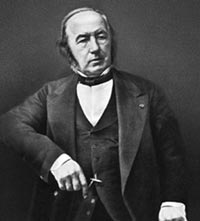
| Born: Jul 12, 1813 at Saint-Julien |
| Died: Feb 10, 1878 (at age 64) at Paris |
| Nationality: French |
| Famous For: Physiology |
Claude Bernard was a French physiologist who was a pioneer in the introduction of blind experiments and the discovery of homeostasis. As a result, he became one France’s best known scientists. The course of Bernard’s professional career was not always smooth, and at times his experiments even caused friction within his own family.
Early Life
Bernard was born into a poor family in Saint-Julien. During his simple education, he wanted to be an author. By the time he was 21, he had written a few plays, but they got horrible reviews from the critics and he decided to try a different line of work.
Bernard enrolled at the Paris Faculty of Medicine, but he was not a good student. He barely obtained his degree in 1843. In 1847, he was accepted as the assistant of the famous but controversial physiologist, François Magendie.
Bernard agreed with Magendie’s unpopular opinion that bodily reactions were suitable for study in a similar way to inorganic matter. Under his superior’s tutelage, Bernard made – and later designed – extensive experiments. He later inherited Magendie’s title as Professor of Experimental Medicine when he died. Bernard, showing more organizational flair than his predecessor, started to attract attention from the scientific community at large.
Experimentation and Controversy
Bernard was fascinated with the mechanics of digestion. He made a number of experiments in which he made openings into the stomachs of live animals in order to study their workings. This brought him considerable opposition from those who were opposed to vivisection, a group which also included several members of Bernard’s own family.
However, his experimentation did result in a number of important discoveries, including the finding that the small intestine played a key role in the digestive process. His experimentation also helped show the significance of the pancreas.
In 1857, Bernard discovered glycogen, the large molecule found in animals’ livers which acts as a reserve store of carbohydrates and helps to regulate blood sugar. Since glycogen was created out of multiple smaller molecules, Barnard demonstrated that animals’ digestions did not work in the same way as those of plants, which were only able to break large molecules into smaller component pieces. Instead, they could work in the other direction as well by creating those large molecules out of simpler substances.
Other Work and Later Life
Bernard also studied the nervous system, realizing that the actions of blood vessels were regulated by particular nerves. He believed that the movement of these vessels was necessary in order for the body to regulate its temperature efficiently. This, he said, explained why people appeared paler when the weather was cold and redder when it was warm. While engaged in this research, Bernard also made the important discovery that oxygen was carried around the body by the red corpuscles in an animal’s blood.
Taken together, Bernard’s findings showed that bodily equilibrium was largely the product a coherent internal force rather than the organs in the body working entirely separately. In 1865, he published a highly respected textbook. Four years later, he had become so renowned that he was elected to the French Academy and Napoleon III even made him a senator.
Upon his death in 1878, Bernard’s fame was such that he was granted a state funeral. This was an extremely rare honor for a man who was neither a military nor a political leader.